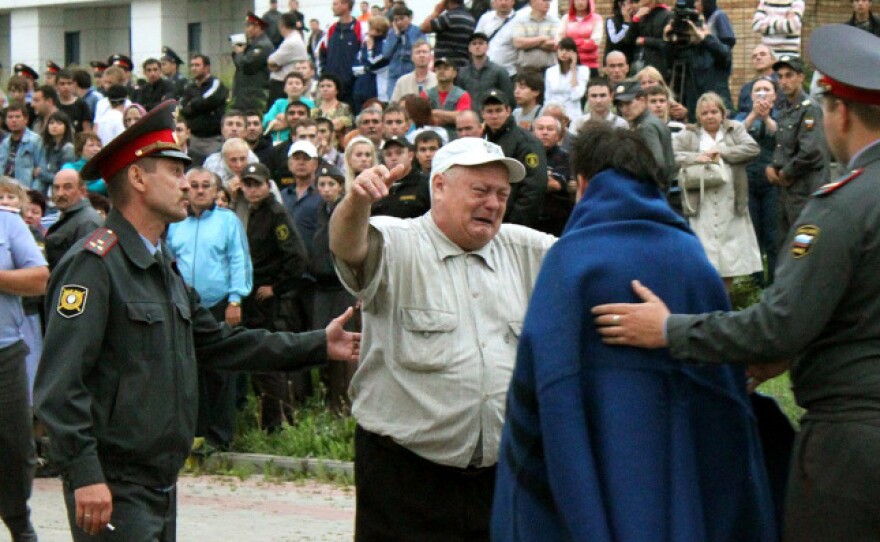Rescuers scoured the wide waters of a Volga River reservoir on Monday, searching with dimming hopes for survivors after an aged, overloaded cruise ship sank amid wind and rain. More than 40 people were confirmed dead, with dozens still missing.
President Dmitry Medvedev on Monday demanded a thorough investigation, called for an assessment of all passenger vessels and declared Tuesday a day of mourning.

Emergencies Minister Sergei Shoigu was quoted by Russian news agencies as saying Monday that 208 people were believed to have been aboard the Bulgaria when it sank Sunday afternoon in the middle of the river in the Tatarstan region, about 450 miles east of Moscow. That's nearly 75 percent more than the 120 the boat was licensed to carry, officials said.
As of midafternoon, 41 bodies had been found, including five children, according to the regional Emergencies Ministry office. The ministry said 80 survivors were rescued, all of them Russian; it was unclear whether any foreigners were aboard. Divers early Monday reported seeing scores of bodies still trapped in the wreckage, and none of those people were believed to be alive.
Many children were aboard the boat, and Russian news reports quoted survivors as saying about 50 children had gathered in the ship's entertainment hall shortly before it sank Sunday afternoon.
8 Minutes, 2 Miles From Shore, 65 Feet Of Water
River cruise boats such as the Bulgaria are highly popular among Russian holiday-makers, conducting cruises ranging from a few days to two weeks.
Igor Panishin of the regional Emergencies Ministry was quoted by the state news agency RIA Novosti as saying survivors reported the ship was leaning to starboard as it made a turn and a wave washed over the deck. It sank within about eight minutes, he said.
The agency cited local investigators as saying the ship was listing even when the voyage began, possibly because of unemptied sewage tanks, and that the port engine was malfunctioning.
The ship sank about 2 miles from shore in about 65 feet of water, officials said.
"It happened very fast. Hatches and windows were knocked out," said Vladimir Shirybyryv, a friend of both survivors and missing people who was waiting at the river port in Kazan for word. Based on a surviving friend's account, he said, "Everyone who survived was covered with fuel oil."
One survivor told the national news channel Vesti 24 that other ships refused to come to their aid.
"Two ships did not stop, although we waved our hands," said the man in his 40s, who stood on the shore amid weeping passengers, some of them wrapped in towels and blankets. He held another man, who was weeping desperately.
President Puts Russia's Passenger Vessels In Spotlight
President Medvedev said he believed the aging riverboat was in poor condition and that there are too many "rust tubs" still allowed to travel on Russian waterways. He called for a full technical assessment of the condition of all of Russia's passenger vessels.

The Transportation Ministry says Russia has 1,568 registered passenger vessels — more than 100 are as old or older than the 56-year-old Bulgaria.
Emergency teams and divers from neighboring regions rushed to the site of the tragedy, 450 miles east of Moscow.
The Volga, Europe's longest river, is up to 19 miles wide in places. The river is a popular tourist destination, especially in summer months.
The Bulgaria was built in 1955 in Czechoslovakia and belongs to a local tourism company. It was traveling from the town of Bulgar to the regional capital, Kazan.
A tourism expert said the lack of partitions inside the Bulgaria made it vulnerable to breaches.
"In case of an accident, these ships sink within minutes," Dmitri Voropayev, head of the Samara Travel company, told RIA Novosti.
Russia's Tourism Industry Union said the ship had not been inspected or retrofitted for years, according to the Interfax news agency.
NPR's David Greene in Moscow contributed to this story, which contains material from The Associated Press
Copyright 2022 NPR. To see more, visit https://www.npr.org. 9(MDAzMjM2NDYzMDEyMzc1Njk5NjAxNzY3OQ001))






